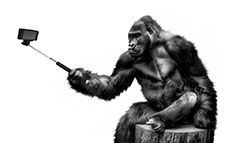Volume 4, Issue 2 (2017) Proceedings from the 14th Annual Meeting of the Document Academy
Librarians Who Drink Beer: Introduction to DOCAM'17 Proceedings
Carol E. B. Choksy
Few physical spaces exist for those outside the natural sciences to perform an experiment in a lab. The circumstances of a science experiment are rarely lonely; they normally include graduate students and often undergraduates in addition to faculty. When the lab has existed for longer than a decade, experiments are quicker to take shape because the knowledge of equipment, techniques, and past failures inform the present. Each of the natural sciences is based upon asking a few very difficult questions such as, “What is the nature of life?” or “How did the universe come to be?”
The Document Academy (DOCAM) is now such a lab for asking the foundational question, “What is a document?”
Small, but nearly continuously attended by many experts, DOCAM is a physical laboratory space to run experiments among a group who have all contributed to the environment of exploration. Each presentation is one experiment—not a polished paper, but a thought experiment contributing to an overall understanding of Documentation Studies.
The knowledge being developed is about the nature of information as social objects, as documents. The questions about documents go to the root of what it means to be human:
- How do we use documents to organize society coercively or cooperatively?
- Why do we privilege one form of information as a document and refuse to recognize others?
- How do we use documents to represent the world and pre-empt other possible representations?
- What is the role of selfies and specimens in a society’s document ecology?
- How does the race for memory technology ensure society forgets the past?
- How can technology help us create new documents out of old documents to better understand the past?
- What does it mean for a document to represent a society’s formulation of the world?
- Can documents help us remember the past or are we doomed to remember what an authoritarian group curates for us?
These questions represent only a few of the ones asked by DOCAM members. The multi-year participation of most members means that each conference is a continuation of the questions from previous years. No one question dominates, though some become better understood.
This year, the specimens: a fossil, a representative plant, a gorilla or antelope in a zoo, a story told by Navaho refugees in Fort Sumner, a Tai Chi exercise, a college student’s assembling a medical dossier to negotiate a disability in classes, rose to the top as an object becoming a social object. Maurizio Ferraris explained how the act of creating a document sits in an economy of documediality as an act of recognition: in the case of selfies, one is creating a document of oneself to situate oneself within that economy.
How we negotiate a particular ecology of documents that appear to carry authority to coerce, persuade, inform, or disinform us also rose to the top. Presentations exploring X-rays in diagnosis, destruction of documents in cultural genocide, quantifying authenticious information-seeking exploits in social media, negotiating posts on a Facebook page about a health problem, teaching informational awareness to undergraduates to inoculate them from bad facts and worse analysis, created an environment where questions about cognitive authority and cognitive authoritarianism can be further refined, possibly to create a new method to measure how documents carry weight to persuade a community.
How documents are transformed from one ecology to another: 19th-century industrial influence on the academic study of chemistry, how museology and art transform social objects from one document economy to another in rhizome fashion, the transformation of our understanding of a film through time. Each of these looked at the deliberate use or destruction of a document’s “affordances” to create or transform our understanding and use of those documents.
Surrounding all of these experiments is the near constant socializing during the conference of the participants who all appear to enjoy beer while discussing their ideas, lives, and beer. Socialization is the other aspect of natural science labs that creates a trust level where failures are celebrated as contributions to the lab as much as successes. The beer may be relegated to the evening at DOCAM, but the discussion at meals, breaks, walks to the conference venue or meal are unabating. The relaxed atmosphere intensifies the lab-like quality of the explorations in each talk.
Article
The Spider: Anaylsis of an Automaton
Susannah N. Munson
Conference Proceedings
The Materiality of Documents and the Genocidal Continuum
Martin I. Nord and D. Grant Campbell
A Palimpsest of Diné Voices
Frances Vitali and Brian C. O'Connor
Science Serving Industry: Documentary Authority and Industrial Influence in 19th Century American Chemistry
Shawn Martin
Before the Antelope: Robert Pagès on Documents
Michael K. Buckland
Training the Masses in “Informational Awareness”
Carol Choksy
Digital Film Preservation: The Search for the Original
Roswitha Skare
[For the system, alternate title: If It Sort of Looks Like a Duck: Reflecting on Bad Photographs and Chains of Custody]
Jodi Kearns and Brian C. O'Connor
On the Borders of the Document: Trip to Turakia
Sabine Roux and Caroline Courbieres
Deconstructing the VISA: Academic Accommodations and Self-Disclosure
Catherine A. Smith PhD
The Value and Problems of Digital Preservation for Historical Documents in China
Yongsheng Chen and Huanning Su

Editors
- Editor
- Shelley Blundell
- Guest Editor, DOCAM'17 Chair
- Carol Choksy
- Editor
- Tim Gorichanaz
- Editor
- Geir Grenersen
- Editor
- Jodi Kearns
- Editor
- Kiersten F. Latham
- Editor
- Bhuva Narayan
Theme
DOCAM'17 called for papers and posters under the theme: Documentation: Informatics, Information Science, Library Science, and Museum Studies.
DOCAM'17 was hosted by the Department of Information and Library Science in the School of Informatics and Computing at the University of Indiana, in Bloomington, Indiana, U.S.A. on September 29-30, 2017. The conference co-chairs are Carol Choksy and Ron Day.
The papers are published in the order they were presented.